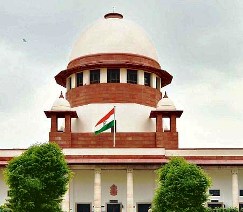More than 3000 people including several legal luminaries and retired Justices have signed an open letter, expressing their disappointment with the Supreme Court ruling in the now volatile ‘Prashant Bhushan Contempt of Court case’. The Court has convicted a prominent lawyer, Prashant Bhushan, for his tweets.
The letter says, ” The tweets were a bona fide expression of concern regarding the functioning of the Supreme Court, which is the fundamental right of every citizen. The intention of that expression was to urge the apex court to restart physical hearings, particularly of matters of national importance. The intention was also to engage with the concerns articulated by many regarding the reluctance of the judiciary to play its constitutionally mandated role as a check on governmental excesses and violations of fundamental rights by the state.”
The letter pointed out that the tweets represented a ‘bona fide criticism’ by a senior member of the bar:
“Such criticism, however fiercely expressed, is in fact a plea to the system to engage with these public concerns. Bona fide criticism, especially by a senior member of the bar, must be taken in the spirit in which it is made – to introspect and thereby strengthen the institution of the judiciary. To hold that such criticism shakes the foundations of the judiciary and needs to be dealt with an iron hand, appears to be a disproportionate response which could, in fact, diminish the reputation of the Court .”
The action taken by the Supreme Court justices speaks poorly of the judiciary’s confidence in itself, the letter says:
If a tweet by an individual is perceived by the judiciary as destroying public confidence in the institution, it speaks poorly of the judiciary’s confidence in itself. As former Chief Justice Bharucha has said, the court should have broad shoulders to ignore such criticism even if it thinks it is unfair and unwarranted. Further, the undue haste with which the matter has been dealt with via virtual hearing amid the pandemic is extremely concerning and has, in fact, been questioned by former Chief Justice Lodha.
Every institution in a democracy has to earn the public’s affection and respect, and the hallmark of a strong institution is its openness to public scrutiny and commentary. The judgment will have a chilling effect on people expressing critical views on the functioning of the judiciary. Stifling of criticism by stakeholders does not bode well for any institution, especially the highest court in the country.
In yet another report from the media, Vakasha Sachdev, echoing the opinions of several lawyers, points out that:
“The problems with this judgment begin with the registration of the case itself. It all began when an advocate from Madhya Pradesh, one Mehek Maheshwari, filed one of the most atrociously worded petitions of all time in the Supreme Court, complaining about Bhushan’s tweet dated 29 June regarding Chief Justice of India SA Bobde and his viral photo with a Harley Davidson superbike.
This petition should have been thrown out by the court at the outset, as it had not been filed with the prior permission of the Attorney General of India. Somehow, it still found itself listed on the administrative side of the court, which then sent it to the judicial side, which then decided to make it a suo motu case, and added on the other tweet that got the judges so riled up.
While the judgment by Justices Arun Mishra, BR Gavai and Krishna Murari points out that no prior permission from the Attorney General is required for a suo motu case to proceed, they have failed to explain why the original petition was not rejected for being defective.”
As per the report in the Hindu, the petition was signed by over 3,000 luminaries, with 12 judges as the primary signitories:
1. Justice Ruma Pal, former Judge, Supreme Court of India 2. Justice B Sudershan Reddy, former Judge, Supreme Court of India 3. Justice GS Singhvi, former Judge, Supreme Court of India 4. Justice Aftab Alam, former Judge, Supreme Court of India 5. Justice Madan B Lokur, former Judge, Supreme Court of India 6. Justice Gopala Gowda, former Judge, Supreme Court of India 7. Justice AP Shah, former Chief Justice, Delhi and Madras High Courts 8. Justice NK Sodhi, former Chief Justice, Kerala and Karnataka High Courts 9. Justice Anjana Prakash, former Judge, Patna High Court 10. Justice Chandru, former Judge, Madras High Court 11. Justice Kannan, former Judge, Punjab & Haryana High Court 12. Justice V. S. Dave, former Judge, Rajasthan High Court.


